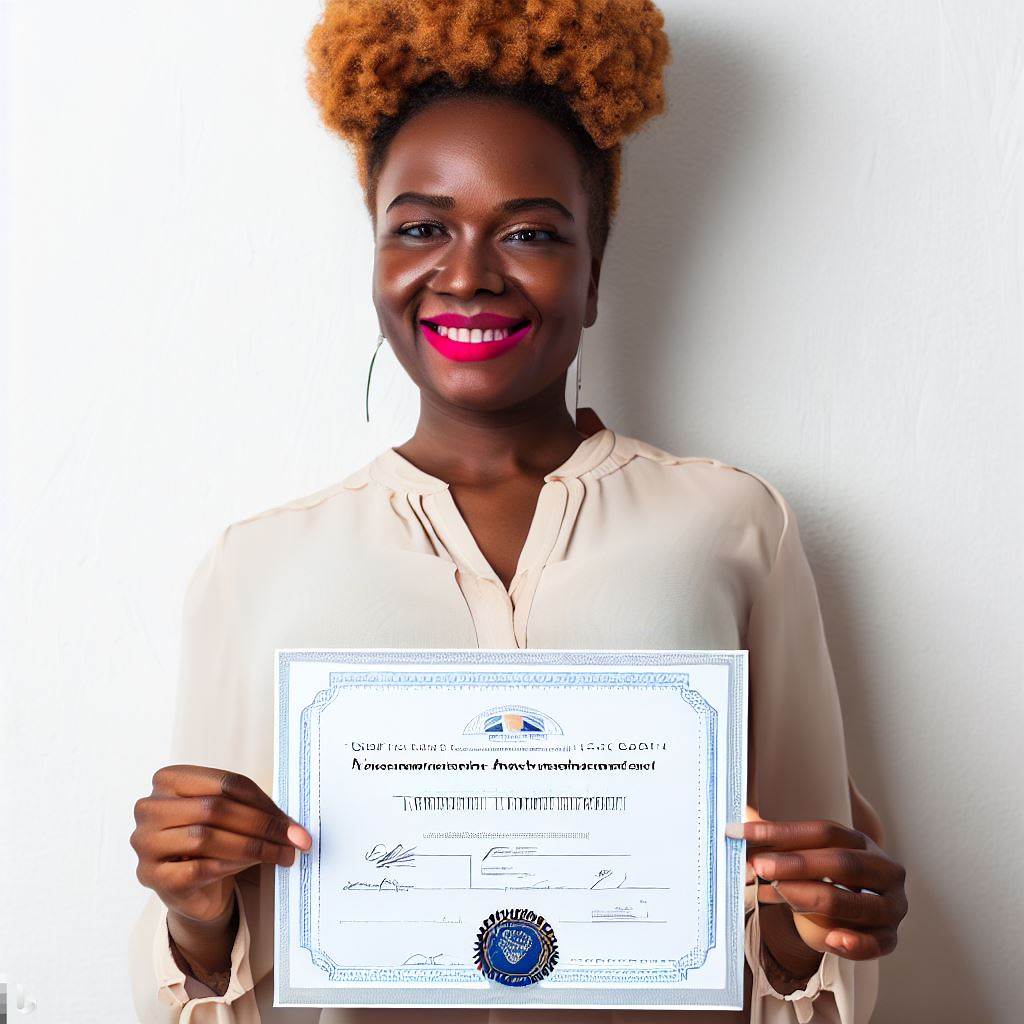Introduction
Nigerian illustrators are making a significant impact on the global art and design scene. Their growing recognition and influence in the industry cannot be ignored.
With their unique style and storytelling abilities, Nigerian illustrators are captivating audiences worldwide.
These talented artists are not only showcasing Nigeria’s rich cultural heritage but also pushing the boundaries of creativity and innovation.
Through their vibrant and vivid illustrations, they are giving a voice to their communities and shedding light on important social issues.
Nigerian illustrators are mastering both traditional and digital techniques to create visually stunning artworks. The use of bold colors, intricate patterns, and detailed linework sets their illustrations apart.
Their work has gained attention from international art galleries, design agencies, and renowned brands, proving that Nigerian illustrators have earned their rightful place in the global art scene.
Moreover, their impact goes beyond just visuals. They are inspiring aspiring artists and designers, encouraging them to embrace their roots, tell their own stories, and challenge the status quo.
Nigerian illustrators are not only reshaping the narrative of African art but also redefining the norms of global art and design.
In the following sections, we will explore the works of some prominent Nigerian illustrators and delve deeper into their contributions to the ever-evolving art and design landscape.
Stay tuned to discover the world of Nigerian illustrators and their creative journey.
Overview of Nigerian Illustrators
Illustration, as an art form, has a rich history and development in Nigeria.
Over the years, Nigerian illustrators have made significant contributions to the field, both locally and globally.
Their unique style and cultural influence have made Nigerian illustrations stand out.
A. History and Development of Illustration in Nigeria
- Illustration in Nigeria can be traced back to ancient times when traditional arts were used to communicate.
- With the arrival of colonialism, Western illustration techniques and styles started to influence Nigerian art.
- During the post-independence era, Nigerian illustrators began expressing their national identity through their work.
- The rise of technology and digital art has also impacted the development of illustration in Nigeria.
B. Notable Nigerian Illustrators and Their Contributions
- Obiora Udechukwu: Known for his intricate linework and use of indigenous materials.
- Tola Atinuke: Her colorful illustrations capture the vibrancy of Nigerian culture.
- Karim Raheem: His illustrations beautifully blend traditional Nigerian motifs with contemporary themes.
- Yele Aluko: His minimalist style reflects the simplicity and complexity of Nigerian life.
C. Unique Style and Cultural Influence in Nigerian Illustrations
Nigerian illustrations are characterized by their vibrant colors, patterns, and strong symbolism.
The cultural influence is evident in the themes and subject matters depicted, often drawing inspiration from Nigerian folklore, traditions, and daily life.
The fusion of traditional Nigerian motifs with contemporary ideas creates a powerful visual language.
The use of adire, a traditional Nigerian textile, and other indigenous materials in illustrations adds an authentic touch to the artwork.
Nigerian illustrators also explore various mediums, including digital art, printmaking, and mixed media, showcasing their versatility and adaptability.
In recent years, Nigerian illustrators have gained international recognition for their unique style and cultural contributions.
Their work has been showcased in prestigious exhibitions and featured in major international publications.
Basically, Nigerian illustrators have a rich history and have made significant contributions to the global art and design scene.
Their unique style and cultural influence have brought a fresh perspective to the field of illustration.
With their continued creativity and innovation, Nigerian illustrators are poised to make an even greater impact on the global art and design landscape.
Read: Top Illustrator Schools and Courses in Nigeria Revealed
Influence on Global Art and Design
A. How Nigerian illustrators have brought new perspectives and diversity to global art and design
Nigerian illustrators have brought new perspectives and diversity to global art and design.
With their unique styles and cultural influences, they challenge existing narratives and stereotypes.
One Nigerian illustrator who has gained international recognition is Karo Akpokiere.
His vibrant illustrations reflect the energy and vibrancy of Nigerian street culture, giving a fresh and dynamic perspective to global art and design.
Another notable Nigerian illustrator is Oresegun Olumide.
His hyper-realistic paintings depict the beauty of everyday life in Nigeria, breaking the stereotype that African art is limited to traditional themes.
B. How their works challenge existing narratives and stereotypes
Through their works, Nigerian illustrators also contribute to promoting cultural understanding and appreciation.
Olalekan Jeyifous, for example, uses his illustrations to reimagine African cities and architecture, showing a futuristic vision that challenges the Western-centric view of urban development.
Nigerian illustrators also tackle social and political issues through their art.
Osaze Amadasun’s illustrations address topics like corruption, inequality, and human rights, bringing attention to important issues that affect not only Nigeria but the world at large.
C. Examples of Nigerian illustrators whose works have gained international recognition and appreciation
In addition to individual illustrators, collectives like the Society for Nigerian Artists and Visual Artists Association of Nigeria have been instrumental in creating platforms for Nigerian artists to showcase their works on an international stage.
They organize exhibitions, workshops, and collaborations that help amplify the impact of Nigerian illustrators on global art and design.
Social media has also played a significant role in spreading the works of Nigerian illustrators worldwide.
Artists like Lemi Ghariokwu, known for his iconic album covers for Fela Kuti, have gained international fame through platforms like Instagram, where their art reaches a global audience instantly.
By challenging existing narratives and stereotypes, Nigerian illustrators inspire other artists globally to embrace their own cultural identities and break free from traditional artistic boundaries.
Their works encourage diversity and inclusivity in the art and design industry, making it more representative of different cultures and perspectives.
Essentially, Nigerian illustrators have made a significant impact on global art and design.
Through their unique styles, cultural influences, and thought-provoking themes, they bring new perspectives and challenge existing narratives.
With international recognition and appreciation, Nigerian illustrators continue to inspire artists worldwide and promote diversity in the art industry.
Read: Earning Potential for Illustrators in Nigeria: A Study
Contributions to the Digital Age
In today’s digital age, Nigerian illustrators have not only adapted to the use of digital tools in their work but have also utilized them to create stunning and innovative illustrations.
A. Adapting to and Utilizing Digital Tools
Nigerian illustrators have embraced the possibilities offered by digital tools such as graphic tablets, software, and online platforms.
These tools allow them to create intricate and detailed illustrations with ease, speeding up their creative process.
They have mastered software like Adobe Illustrator and Photoshop, using their features to experiment with different color palettes, textures, and effects.
This has led to the creation of visually striking and visually appealing illustrations that attract a global audience.
Additionally, Nigerian illustrators have embraced the convenience of working digitally, which allows for easy editing, scalability, and versatility in creating various versions of an illustration.
This flexibility is crucial when working with clients who may require adjustments or modifications to the original artwork.
B. Impact of Social Media Platforms
Social media platforms have played a significant role in promoting and sharing Nigerian illustrations globally.
Platforms such as Instagram, Twitter, and Facebook have become the go-to places for Nigerian illustrators to showcase their work and connect with a vast audience.
By leveraging hashtags and sharing their work consistently, Nigerian illustrators have been able to reach a global audience and gain recognition beyond their local communities.
The power of social media has allowed their art to transcend geographical boundaries and attract international clients and collaborations.
Moreover, social media platforms have facilitated a sense of community among Nigerian illustrators.
They can connect, share experiences, and support each other’s work, forming a strong network that nurtures and uplifts the art community.
C. Collaborations with Global Brands and Organizations
Nigerian illustrators have started collaborating with global brands and organizations, further amplifying their impact on the global art and design scene.
These collaborations provide a platform for them to showcase their talent and creativity to a larger audience.
Global brands recognize the unique perspectives and artistic styles that Nigerian illustrators bring to the table.
By collaborating with them, these brands tap into the rich cultural heritage of Nigeria and gain fresh insights that resonate with diverse audiences.
These collaborations not only benefit Nigerian illustrators by offering exposure and opportunities but also contribute to diversity and inclusivity in the global art and design industry.
Nigerian illustrators have made significant contributions to the digital age. By adapting to and utilizing digital tools, they have created stunning illustrations that capture the attention of a global audience.
Through social media platforms, Nigerian illustrators have promoted and shared their work, reaching an international audience.
This has led to collaborations with global brands and organizations, further amplifying their impact and fostering diversity in the industry.
As their influence continues to grow, Nigerian illustrators are shaping the global art and design landscape, contributing their unique perspectives and celebrating the rich cultural heritage of Nigeria.
Read: Freelancing as an Illustrator in Nigeria: Pros and Cons

Narrative Representation and Identity
- Nigerian illustrators showcase their storytelling skills by utilizing their artwork as a medium to tell compelling stories.
- Through their illustrations, Nigerian artists are able to represent Nigerian culture and identity, capturing the essence of the nation.
- Their work often reflects the diversity, traditions, and rich history of Nigeria, making it more accessible to a global audience.
- Moreover, Nigerian illustrators play a crucial role in portraying the challenges, triumphs, and everyday experiences of Nigerians through their art.
- By incorporating elements such as clothing, food, and landscapes, they create a vivid visual narrative that resonates with people from different backgrounds.
A. Importance of Diverse Representation in Art and Design
- Diverse representation in art and design is vital as it gives voice and visibility to underrepresented communities.
- Nigerian illustrators contribute to this importance by showcasing the richness and complexity of Nigerian culture and identity.
- Through their work, they challenge stereotypes, break barriers, and promote a more inclusive art industry.
- By featuring diverse characters in their illustrations, Nigerian illustrators provide a platform for marginalized individuals to see themselves represented.
- This representation fosters a sense of belonging and empowerment, enhancing the overall appreciation and understanding of different cultures.
B. Nigerian Illustrators and the Global Art Community
- Nigerian illustrators are actively contributing to a more inclusive global art community by sharing their unique perspectives and stories.
- Their work challenges prevailing Western-centric standards of art and design, diversifying and expanding the global artistic landscape.
- Through collaborations and exhibitions, Nigerian illustrators facilitate cross-cultural exchanges, promoting cultural appreciation and understanding.
- They inspire and empower other artists from around the world to embrace diversity and celebrate their own unique cultural identities.
- Nigerian illustrators also play a significant role in shifting the narrative around African art, showcasing its depth, beauty, and global relevance.
Generally, Nigerian illustrators play a crucial role in representing and preserving Nigerian culture and identity through their artwork.
By utilizing their skills to tell stories and challenge stereotypes, these artists contribute to a more inclusive global art community.
Through their creativity and unique perspectives, they highlight the importance of diverse representation in art and design.
Nigerian illustrators inspire and empower both fellow artists and audiences, showcasing the beauty and complexity of Nigerian culture.
Their work serves as a testament to the richness of narratives and the power of art in promoting understanding and unity across different cultures.
Read: A Day in the Life of a Professional Illustrator in Nigeria
Challenges Faced by Nigerian Illustrators
When it comes to Nigerian illustrators, there are several challenges and obstacles they face in gaining recognition and opportunities in the global art and design industry.
These difficulties stem from various factors, including limited resources and infrastructure, but there have been efforts made by organizations and individuals to support and uplift Nigerian illustrators.
Limited Resources
Nigerian illustrators often face challenges due to limited access to resources such as art supplies, technology, and educational opportunities.
This scarcity makes it difficult for them to compete on a global scale and limits their ability to fully showcase their talents.
Infrastructure Constraints
The lack of proper infrastructure can hinder the growth of Nigerian illustrators.
Limited access to reliable internet, electricity, and studio spaces makes it challenging for them to create and promote their work effectively.
These constraints also affect their ability to connect with potential clients and collaborators globally.
Recognition and Opportunities
Nigerian illustrators often struggle to gain recognition and secure opportunities in the global art and design industry.
They face stiff competition from artists in more established art scenes, making it harder for them to justify their unique perspectives and styles.
Underrepresentation
Underrepresentation is another challenge faced by Nigerian illustrators.
They often do not receive adequate representation in major art exhibitions, galleries, and publications.
This lack of visibility limits their exposure and hampers their chances of building a robust professional network.
Efforts to Support Nigerian Illustrators
Despite these challenges, there have been commendable efforts made by organizations and individuals to support and uplift Nigerian illustrators.
These initiatives aim to provide them with the necessary resources and opportunities to showcase their talent and thrive in the global art and design scene.
Publish Your Professional Profile, Business or Brand
Showcase your expertise, gain trust, and boost visibility instantly on Professions.ng.
Publish NowArtistic Collectives and Communities
Numerous artistic collectives and communities have emerged in Nigeria, creating platforms for collaboration, mentorship, and skill exchange among illustrators.
These groups play a vital role in fostering a supportive ecosystem and empowering Nigerian illustrators.
Educational Initiatives
Several educational initiatives have been established to enhance the skills and knowledge of Nigerian illustrators.
Workshops, seminars, and online courses are organized to provide training in various aspects of illustration, helping them overcome the limitations imposed by the lack of formal education.
Online Presence and Social Media
Embracing the power of the internet and social media, Nigerian illustrators are utilizing online platforms to showcase their work to a global audience.
Websites, blogs, and social media accounts allow them to connect with potential clients and collaborators, bypassing infrastructure constraints.
Collaboration and Networking Opportunities
Both local and international organizations are creating opportunities for Nigerian illustrators to collaborate and network with artists and professionals from around the world.
These partnerships help bridge the gap and increase exposure to global markets.
Despite the challenges faced by Nigerian illustrators in gaining recognition and opportunities in the global art and design industry, efforts are being made to support their growth and uplift their status.
By addressing limited resources and infrastructure constraints and providing platforms for collaboration and education, Nigerian illustrators can overcome these obstacles and make their mark on the global stage.
See Related Content: A Guide to Event Photography in Nigeria’s Bustling Cities
The Future of Nigerian Illustration
As the Nigerian illustration scene continues to gain recognition and momentum, it is exciting to speculate on the future growth and potential of Nigerian illustrators in the global art and design industry.
- Increased Representation: Nigerian illustrators actively build international visibility by leveraging social media to share their work and connect globally.
- Diverse Styles: Nigerian illustrators uniquely blend traditional Nigerian elements with contemporary influences, setting them apart and enhancing their global market competitiveness.
- Collaboration and Networking: Nigerian illustrators actively collaborate with diverse artists, fostering cross-cultural exchanges, fueling creativity, and paving the way for new opportunities.
- Increased Demand: As Nigerian illustration gains recognition, it will fuel demand for its unique art and design skills, attracting international interest.
- Influence on Global Trends: Nigerian illustrators, with their rich cultural heritage and storytelling skills, can actively shape global art and design trends, inspiring artists worldwide.
Other Future Speculations
- Educational Opportunities: The increasing demand for Nigerian illustrators necessitates specialized education and training programs to nurture talent and provide essential skills.
- Entrepreneurial Opportunities: Nigerian illustrators can leverage their skills and creativity to enter the art and design industry, build businesses, sell art, and partner with brands, driving economic growth.
- Cultural Preservation: Nigerian illustrators can preserve and showcase Nigerian culture actively, by infusing traditional elements into their artwork, thus celebrating heritage.
- Advocacy for the Arts: Nigerian illustrators’ rising success can rekindle a drive for arts education and advocacy, demonstrating art’s influence and fostering support.
- Sustained Momentum: Encourage industry collaboration and support for Nigerian illustration via mentorship, exhibitions, funding, and platforms that celebrate illustrators.
In general, the future looks bright for Nigerian illustrators in the global art and design industry.
With their unique styles, cultural influences, and increasing recognition, Nigerian illustrators have great potential to make a lasting impact on the global stage.
By embracing emerging trends, fostering collaboration, and sustaining momentum, the Nigerian illustration scene can continue to flourish and inspire future generations of artists and designers.
Explore Further: Challenges and Opportunities in Nigeria’s Interior Design Field
Conclusion
Nigerian illustrators have made a significant impact on the global art and design scene.
Throughout this blog post, we have explored several key points that highlight their importance.
Nigerian illustrators bring a unique and diverse perspective to art and design, showcasing their rich cultural heritage.
They have broken barriers and challenged stereotypes, providing fresh and innovative ideas to the global creative community.
Their works have been recognized internationally, earning accolades and collaborations with renowned brands and publications.
By supporting Nigerian illustrators, we not only appreciate their talent but also contribute to the growth and development of the global art and design industry.
Furthermore, exploring their works allows us to immerse ourselves in their stories, traditions, and immense creativity.
We encourage readers to actively seek out and appreciate the works of Nigerian illustrators.
By supporting and sharing their art, we become part of a global movement that values diversity and celebrates cultural exchange.
Through our support, we empower Nigerian illustrators to continue pushing boundaries and shaping the future of art and design.
Let us embrace this opportunity to learn, appreciate, and support the works of Nigerian illustrators in their journey towards global recognition.




